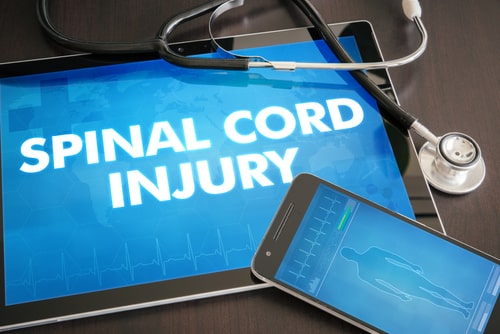When Can Spinal Cord Injuries Lead to Paralysis?
 Injuries that affect the back and spine can be very serious, and in some cases, they can lead to life-altering conditions, including paralysis. A spinal cord injury can disrupt the central nervous system's ability to communicate effectively with the body, potentially resulting in partial or complete loss of muscle function and sensation below the injury site. In cases involving spinal cord injuries, an experienced attorney can address legal concerns and ensure that a victim takes the proper steps to secure the necessary support and compensation.
Injuries that affect the back and spine can be very serious, and in some cases, they can lead to life-altering conditions, including paralysis. A spinal cord injury can disrupt the central nervous system's ability to communicate effectively with the body, potentially resulting in partial or complete loss of muscle function and sensation below the injury site. In cases involving spinal cord injuries, an experienced attorney can address legal concerns and ensure that a victim takes the proper steps to secure the necessary support and compensation.
Types of Spinal Cord Injuries and Their Effects
Spinal cord injuries are classified into two main types: complete and incomplete. A complete spinal cord injury means there is no sensory or motor function below the level of the injury. These injuries may occur if the spinal cord is cut or severely damaged.
In contrast, an incomplete injury means there is some functioning below the primary level of the injury. Partial damage to the spinal cord may occur due to issues such as broken vertebrae in the spine, herniated discs that place pressure on the spinal cord, or other forms of damage that can disrupt nerve function.
The impact of these injuries depends greatly on the location of the spine where the injury occurs:
1. Cervical Spinal Cord Injuries
-
Location and impact: This section of the spine is in the neck, and it controls signals to the back of the head, shoulders, arms, hands, and diaphragm. An injury here can result in tetraplegia (also known as quadriplegia), where both arms and legs are paralyzed.
-
Specific effects: Depending on the severity and the exact vertebrae affected (C1 through C8), a victim may experience paralysis in all limbs, they may have difficulty breathing without assistance, and they may require comprehensive, round-the-clock care.
2. Thoracic Spinal Cord Injuries
-
Location and impact: These injuries occur in the upper and mid-back areas, which affect the chest and abdominal muscles. Paraplegia is common with thoracic spinal cord injuries, and paralysis may affect all or part of the trunk, legs, and pelvic organs.
-
Specific effects: Lower thoracic injuries might allow for good control over the hands, but paralysis may impair the legs and lower body function, impacting mobility and daily activities significantly.
3. Lumbar Spinal Cord Injuries
-
Location and impact: The lower back is crucial for controlling the hips, legs, and some pelvic organs. Injuries to the lumbar spine often result in a loss of function in the hips and legs.
-
Specific effects: People with lumbar injuries might still be able to walk with support, or they may require a wheelchair for mobility. They also may have difficulties with bladder and bowel control.
4. Sacral Spinal Cord Injuries
-
Location and impact: Injuries in this area affect the back of the thighs, the lower parts of the legs, the feet, and genital organs.
-
Specific effects: People with sacral spinal cord injuries may be able to walk, but they might have some problems with leg movement. They may also experience sexual dysfunction and loss of bowel or bladder function.
Managing Spinal Cord Injuries
In many cases, spinal cord injuries result from accidents in which someone else was at fault. The strong impact of a car accident or the impact with the ground in a slip-and-fall accident can damage different parts of the spine. Injuries can also occur due to negligence during athletic activities or workplace accidents.
After suffering this type of injury, rehabilitation and medical treatment are crucial, and early intervention can significantly impact the victim’s quality of life. A person who suffers from paralysis or other symptoms may require physical therapy, occupational therapy, and the use of adaptive technologies. They may also face limitations on the types of work they can perform and other activities that they can participate in.
Contact a San Jose Spinal Cord Injury Attorney
Spinal cord injuries can dramatically alter a person’s life. When navigating the aftermath of this type of injury, a person will not only require medical intervention, but they can benefit from legal assistance as well. At Law Office of John J. Garvey, III, our San Jose spinal cord injury lawyer can help protect the rights of injury victims and ensure that they receive the compensation necessary to cover medical expenses, loss of income, pain and suffering, and other damages. Contact us today at 408-293-7777 for a free consultation and to learn more about how we can provide assistance with a personal injury case and recover the full compensation an injury victim deserves.









